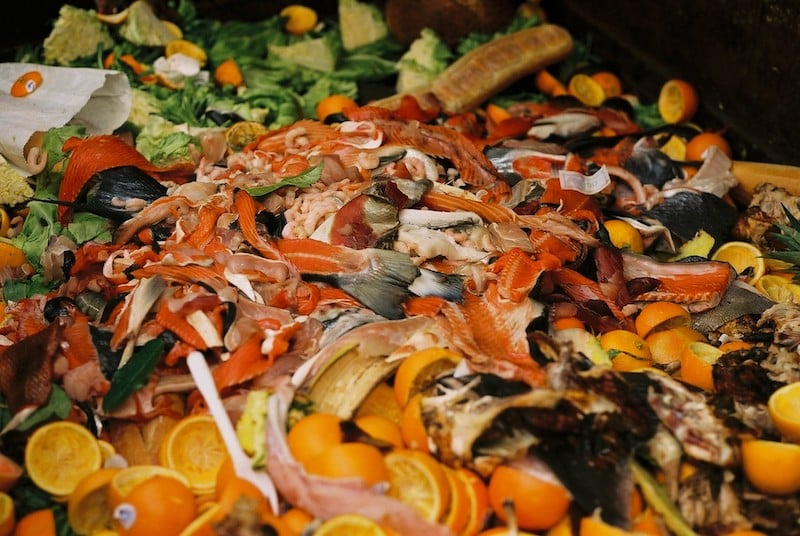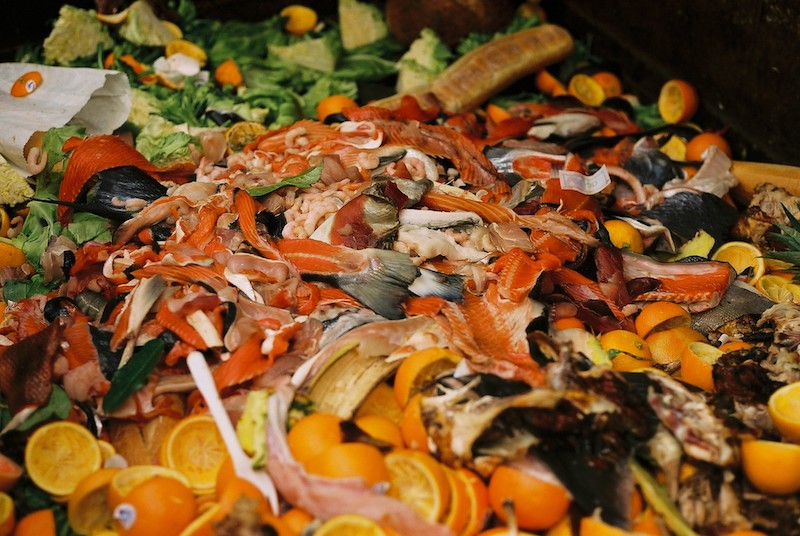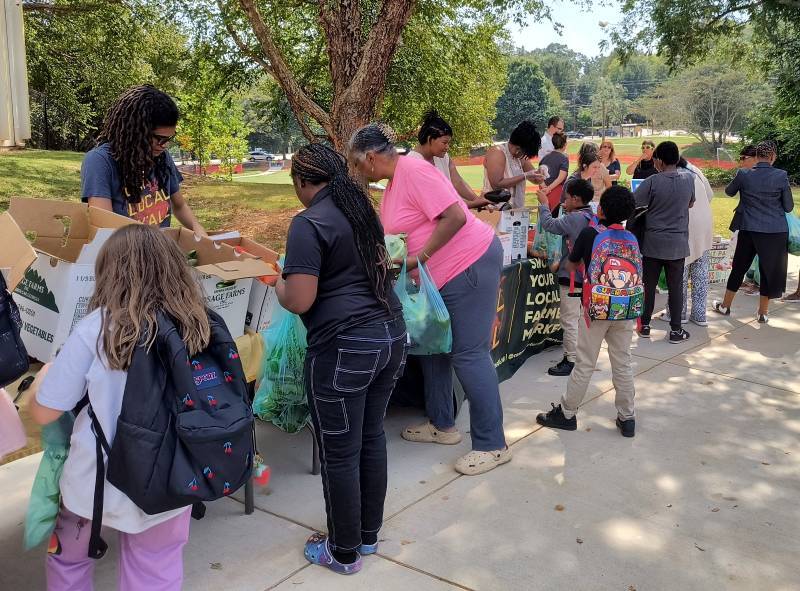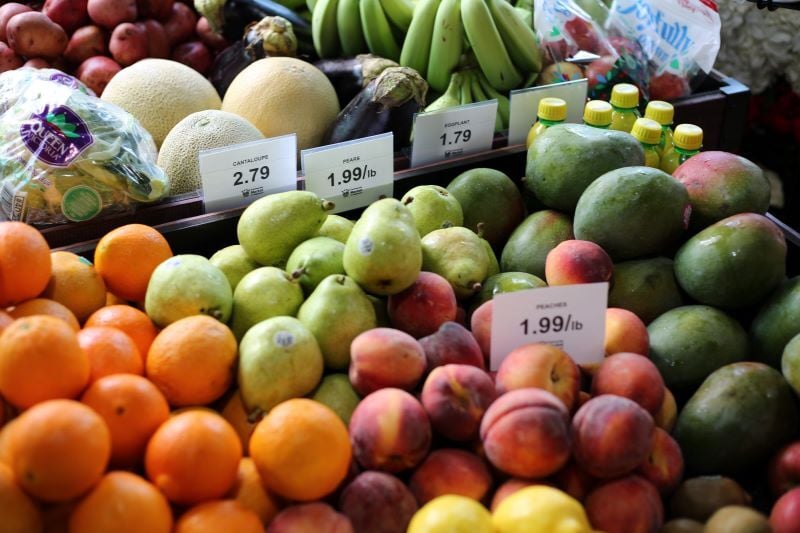Food waste can happen all along the journey from the farm to your plate, and it continues in our homes and in restaurants when we purchase more food than we consume.
According to the non-profit organization ReFED, around 102 billion pounds of food are thrown away by businesses and farms every year in the United States, with Georgia contributing around 4% of that figure despite only housing 3% of the U.S. population.
In this blog post, we are going to explore the problems with how we handle our surplus food at all levels in Georgia and solutions that we have access to right now to help mitigate the environmental impact of our food waste.

What is “Food Waste”?
We define food waste as any surplus food, food (both edible and inedible) that is not sold or consumed by businesses or individuals – food that isn’t donated, composted, or otherwise recycled. To gain a greater understanding of how food waste is generated, please see this previous blog post on Fighting Food Waste.
How is Food Waste Bad for The Environment?
Globally, if food waste were measured as a country, it would be the world’s third largest polluter – after the United States and China – producing a whopping 8-10% of global emissions. This is due to the greenhouse gasses released throughout food production, processing, and distribution. Furthermore, when food waste ends up in landfills, it continues to produce greenhouse gas emissions as it decomposes.
In Georgia, approximately 4 billion pounds of food is wasted every year, contributing 8.33 megatons of our state’s carbon emissions. To put that in perspective, 8.33 megatons is equivalent to:
-
9.215 billion pounds of coal burned
-
937.3 million gallons of gasoline consumed
-
360.6 million bags of waste landfilled
Although these figures can be hard to comprehend due to the sheer volume of food waste that is normalized in our economy, there are ways for all stakeholders in Georgia to help reduce the amount and impact of food waste.
.jpeg?width=800&height=533&name=Compost%20Pile%20with%20Sprout%20(image%202).jpeg)
Food Waste Solutions to Reduce Greenhouse Gas Emissions
Solutions to help us reduce food waste in Georgia are happening on three fronts: residential, commercial, and governmental.
How Georgians are Reducing Food Waste at Home
It is estimated that around 37% of food waste occurs in the home, which for the U.S. as a whole measures up to 60 billion pounds of food annually (worth roughly $158B), but there are plenty of solutions available to the majority of Georgians to help reduce and divert their food waste:
-
Reduce the amount of perishable items you buy in bulk.
-
Label items with the date you opened or prepared them to help you be mindful about consuming food before it spoils.
-
Compost the food scraps or food waste you inevitably produce. It’s the best way to minimize the environmental impact of food waste while also supporting regenerative agriculture! If you aren’t composting, check out the How to Compost at Home in Georgia toolkit for some quick and easy ways to get started.
-
If you are unable to compost, putting your food scraps in your garbage disposal instead of your trash bin reduces the environmental impact of your food waste
How Can We Reduce Food Waste from Farms, Restaurants and Other Commercial Businesses
Depending on your business as well as your location, solutions may vary. Below are some ideas that may work for you.
How to Reduce Food Waste in Food Production
Retaaza is a Georgia-based social enterprise that strives to make local and rural food more accessible and affordable, including connecting farmers’ surplus food to local consumers and families fighting food insecurity.
How to Reduce Waste in Businesses
Goodr, where I serve as the Sustainability Coordinator, is a Georgia-born sustainable food waste management company that leverages technology and logistics to combat hunger and food waste, offering recovery services for both edible and inedible surplus food for businesses.
CompostNow is a nonprofit organization that has been offering composting services for both commercial and residential customers in much of the Metro Atlanta area since 2017.
COR Compost provides composting services to both residential and commercial customers in the Savannah area.
How to Reduce Food Waste in Our Communities
Local and municipal governments can help reduce food waste by implementing composting programs and food recovery systems in places like schools, government offices, and in public hospitals and prisons.
In addition, governmental action is helpful in getting your community organized to prioritize reducing food waste. Some ideas for how that can work include:
-
Publishing guidance around food safety for donations
-
Funding for food donation and composting infrastructure
-
Tax incentives for composting
-
Requiring food waste generators to disclose/report on food waste
-
Signing the petition and advocating for the Food Donation Improvement Act (FDIA) that is in the United States Congress
Beyond Carbon: How Will Reducing Food Waste Improve Equity and Our Environment?

Not only is food waste one of the largest contributors to carbon emissions, but it is also directly responsible for many of the inequities we see in our food systems. In the United States, the poorest Americans spend 34% of their income on food, with food insecurity costing the country at least $160 billion annually due to healthcare spending, education services, and lost productivity.
Approximately 1 in 8 Georgians struggle with food insecurity, totaling 1,338,988 people, despite the abundance of food being thrown away. If we assume that two-thirds of Georgia’s 4 billion pounds of food waste is edible, Georgia has enough food to feed 1,894,732 people for a year, 42% greater than the amount of food insecure individuals, according to USDA data on annual food consumption.
We aren’t ready to declare a future with zero food waste, but we can make an impact that would benefit hundreds of thousands of Georgians positively. We’ll see both a socioeconomic and an environmental impact if we reduce 12% of our food waste through food donation annually:
Socioeconomic:
-
Pounds of food diverted from landfill: 480,000,000 pounds
-
# Of Georgians fed for a year: 339,355 (25% of Georgia’s food insecure population)
-
Gallons of water saved: 47.52 billion gallons
Environmental:
-
Amount of carbon emissions reduced: 1 megaton (2.205 billion pounds), which equates to:
-
16.66 million urban tree seedlings grown for 10 years
-
43.29 million trash bags of waste diverted from landfill
-
121.6 billion smartphones charged
-
2.481 billion miles driven by a passenger vehicle
-
Reducing our food waste by 12% can happen when we each make small or incremental improvements in our homes, businesses, and governments. Furthermore, each pound of food waste diverted from landfill prevents anywhere from 0.5-5 pounds of carbon emissions into the atmosphere. Each of these changes add up, and over time will multiply like compounding interest, getting us to the sustainable future that we want for the next generation.








